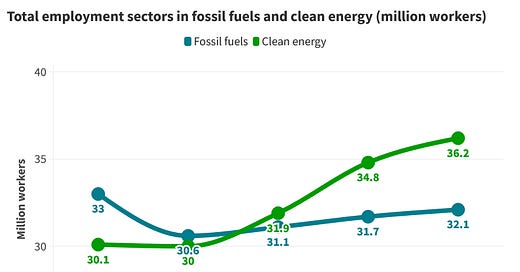Renewable energy jobs have promising prospects but face skills shortage
During COP28, countries agreed to triple renewable energy capacity by 2030. As these goals transform into more concrete plans, investments in renewable energy are anticipated to rise substantially, providing an opportunity for companies to hire for major renewable energy jobs.
With the increase in investment in renewable energy every year, the industry's growth has created employment opportunities in various areas, including research and development, project management, grid integration, energy storage, manufacturing, installation, and maintenance. However, with these increasing opportunities, the market has noticed a shortage of skills.
Reuters reported that the Economist Impact and Spanish energy company, Iberdrola concluded that the green transition is at risk due to business leaders not developing and sourcing green skills.
The report surveyed 1,000 business leaders globally and stated that although the leaders are well aware of the need for skills to drive into the green transition, only 55% of them have supported their workers to gain the skills.
But in the long term, helping employees gain these skills will only help the companies, as more sets of renewable energy jobs will be available to meet the net zero goal.
Top countries to produce renewable energy jobs
The renewable energy sector serves as a vital sector for job creation worldwide. The IRENA reported in its annual review in 2023 that investments in renewable energy surged by 43%, going up from USD 348 billion in 2020 to USD 499 billion in 2022.
Globally, the sector generated 13.7 million jobs in 2022 (Figure 1). That is more than an 88% increase in a decade.

Solar photovoltaics (PV) became the top sector to employ 4.9 million workers in 2022. That is over a third of the total renewable energy workforce. Bioenergy followed with 3.58 million. Hydropower maintained similar job numbers in 2022 and 2021, employing around 2.5 million people each year.
Related: 7 disadvantages of solar energy
Related: Maximizing energy efficiency with solar-powered windmills
Figure 2 shows the example of the top 10 solar developers with their capacity in 2023. With continuous government backing, advancing technology, and a growing skilled workforce, the transition to renewable energy could create substantial job opportunities, driving economic development and prosperity across various communities.

Energy jobs creation
Despite facing numerous challenges, the year 2022 provided an employment to about 67 million individuals globally in energy sector. Notably, majority of the growth occurred in the sectors, such as solar PV, wind, EVs and batteries, heat pumps, and critical minerals mining.
Related: Energy security concerns lead to more coal production
As expected, China led the way with 5.55 million renewable energy jobs (Figure 3). Other significant contributors include Brazil, EU nations, the U.S., and India. Together, these regions play vital roles in equipment manufacturing, engineering, global capacity installations, and related services.

The global energy sector witnessed a continued expansion in employment last year with an investment of approximately USD 2.8 trillion.
Figure 4 shows the yearly increase of job opportunities in the energy sector since 2019. Clean energy employment has overtaken fossil fuels since 2021 and has employed 36.2 million workers in 2023.
However, to meet the target of tripling renewable energy by 2030, the world needs to generate more jobs, and there needs to be a significant investment in energy transition technologies.

Securing the future with investment in green skills
Solar energy has proven to be the most popular and fastest-growing sector in renewable energy employment. Yet, millions of additional jobs will emerge in the upcoming years and decades.
Related: Germany reaches a record high in the installation of renewable energy
IEA surveyed 160 energy companies worldwide and they agreed that facing skilled labor shortages has been a significant obstacle to increasing operations. Notably, installation and repair work positions have been the most challenging to fill due to a shortage of industry-specific expertise.
To address this will require accompanying measures, such as transitioning workers from fossil fuel industries. Additionally, educational and training programs are required because the number of people pursuing degrees in the energy sector does not match the expanding demand.
Related: Renewable energy investments call for stronger commitment to net-zero initiatives
Although numerous institutions are seeking partnerships to develop skills, this is where the challenge of the businesses is— to make their workforce ready to achieve their climate goals because companies win when renewable energies win.
On the other hand, governments should focus on approving policies and regulations to promote the adoption of renewable energy. Supportive measures, such as allocating funds specifically for climate initiatives, subsidies, tax incentives, and regulatory frameworks are crucial in driving investments and creating favorable conditions for job and skills growth in the sector.
Follow us on our Instagram, Facebook, LinkedIn and Twitter.
Have some feedback or want to sponsor this newsletter?
Thank you for reading. If you liked this post, please click the ❤️ button. That would improve my visibility. If you love The Green Solutions, would you share your experience with a quick text testimonial by clicking here? Thank you very much.




